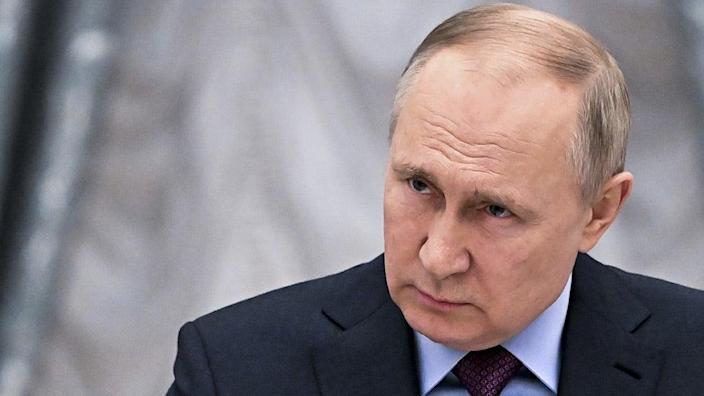
The globally coordinated sanctions against Russia over its invasion of Ukraine are aimed at regime change in Moscow, a top Greek diplomat told The Hill in an interview in Washington, D.C.
Greek Alternate Foreign Minister Varvitsiotis Miltiadis praised President Biden for corralling democracies to impose coordinated sanctions, but warned that Turkey’s absence on some of the most punishing measures risks undermining the global push to punish Putin.
Athens holds long-standing concern over Turkey’s behavior in the eastern Mediterranean and within the NATO alliance in general, but Miltiadis was in Washington urging policy makers to more firmly press Turkey to align with the West.
“If we don’t drag [Turkey] into the sanction regime, then Russia will not feel as heavy [pressure from] the package of these sanctions that have already been imposed,” Miltiadis said in an interview at the Greek Embassy last week.
Secretary of State Antony Blinken has said that the coordinated sanctions are not about regime change, telling CBS in an interview on March 6 that “the Russian people have to decide who they want to lead them.”
But Miltiadis emphasized that the sanctions are aimed at stoking the opposition in Russia.
“The sanctions … are dedicated in order to bring down the Putin regime by internal unrest – and this is the idea that we create,” he said, “a climate into Russia that this act of aggression is going to be costly for the economy of Russia, and to build up the unrest and the opposition to Putin.”
The Greek government holds a deep affinity for Biden, who they view as having personally advocated for the country’s economic survival after the 2008 financial crisis, when he served as vice president during the Obama administration.
Yet American and Greek ties deepened under the administration of former President Trump, pushing back on nascent ties between Athens and the Kremlin due to a policy that favored bilateral partnerships over multilateral alliances.
Washington grew even closer to Greece as it strengthened its ties with Israel, countering Turkey’s antagonism – with Ankara pushing for natural gas exploration in territorial waters claimed by Greece and Cyprus and hosting the Iran-backed Hamas terrorist group, which seeks the elimination of Israel.
Congress codified the U.S. and Greek relationship in two significant pieces of legislation over the past two years.
Miltiadis, who replaces Greece’s foreign minister if he is unable to perform his duties, urged the U.S. to further prioritize its relationship with Greece, deepening the already strengthened military cooperation, and work to avoid conflict in the eastern Mediterranean.
He called Greece’s Port of Alexandroupolis, where American naval and military supplies transit, “the main gateway for bringing new defense equipment in the southeastern flank of NATO”.
Still, Miltiadis raised concern that Turkish President Recep Tayyip Erdoğan is a problematic ally, saying that while the Turkish president is hosting peace talks between Russian and Ukrainian officials, Ankara is a potential weak link in holding Putin accountable.
Turkey, which is a member of NATO but not the European Union, was not obligated to join in on the E.U. sanctions package against Russia. Turkish Foreign Minister Mevlüt Çavuşoğlu reportedly said at a diplomatic forum last week that Ankara had no intention of joining the sanctions regime.
“We believe that the sanctions will not resolve the problem,” he said, according to the Russian-state owned TASS news agency.
Turkey holds deep economic ties to Russia. Miltiadis said Ankara has held back from blacklisting Russian banks from the SWIFT financial messaging system imposed by the E.U. – which blocks Russian banks from transacting with banks in Europe – and has not blocked the export of dual-use goods related to energy and weapons development.
“The fact that Turkey is not coming alongside is causing a big loophole in the whole sanction-structure,” Miltiadis warned, also raising concern that Ankara did not join in sanctioning Russian oligarchs or closing its airspace to Russian flights.
“Now, all the oligarchs may move their yachts to Turkey and still enjoy the Mediterranean sea. … They can travel because they’re using the Istanbul airport,” he said.
Reuters reported on Tuesday that at least two yachts belonging to recently sanctioned Russian billionaire Roman Abramovich were docked in a Turkish resort. The United Kingdom imposed sanctions on Abramovich on March 10 for financially benefiting from his relationship with Putin.
The Turkish Embassy in Washington could not be reached for comment.
While Turkey is not imposing its own sanctions, its trade with Russia is still being affected by those instated by the U.S. and others.
Aykan Erdemir, senior director of the Turkey Program at the Foundation for Defense of Democracies and a former member of the Turkish parliament, said that Turkey is blocked from exporting dual-use goods that have sanctioned U.S. components, but is largely free to export goods that don’t fall under this blacklist.
Turkey and Russia are not allies and are often on opposite sides of regional conflicts, said Paul Stronski, a senior fellow for Russia and Eurasia program at the Carnegie Endowment for International Peace.
Since 2019, Turkey has reportedly supplied Kyiv with Bayraktar drones in the war against Russian-backed separatists in eastern Ukraine. Stronski said Russia’s full-scale invasion of the country has likely “unnerved” Turkey.
“Russia and Turkey have a complex relationship, you’re seeing that complexity both in how they [Turkey] haven’t fully bought into Western sanctions, haven’t closed their airspace, but have been providing military help to the Ukrainians,” he said.
But Erdoğan and Putin are somewhat kindred spirits in how they view threats from democracies and their grievances against the lost power of their countries’ former empires – the Ottoman Empire for Erdoğan and the Soviet Union for Putin.
“Both leaders find each other to be very convenient vehicles through which they can voice their displeasure with the West,” Stronski said, adding that “Greece is concerned about revanchism from its neighbors, and so what Russia has done just highlights that animosity and that concern.”
Miltiadis warned that while Greece is wary of Erdoğan and Turkey, both Athens and Ankara are working to project NATO Unity, most recently displayed with a visit last week by Greek Prime Minister Kyriakos Mitsotakis to see the Turkish president.
“The major understanding is that, in these critical times, we shouldn’t bring the Greek-Turkish tensions back on the table, that they’re going to destabilize the eastern flank of NATO and the security architecture in the Mediterranean,” Miltiadis said.
“We don’t want to make a spillover, or to give any incident that will make a spillover of the crisis into the Mediterranean, which is very important.”




